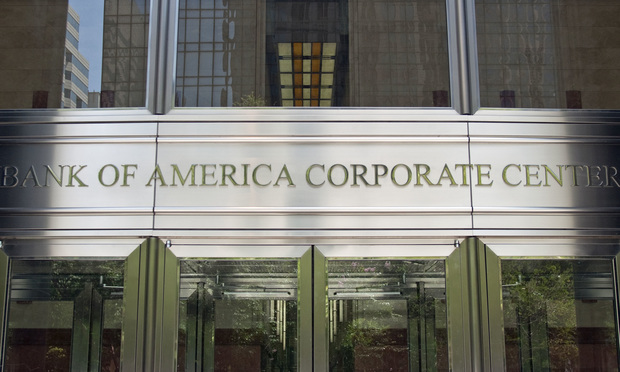 Bank of America World Headquarters in Charlotte, North Carolina.
Bank of America World Headquarters in Charlotte, North Carolina.
A federal judge declined to grant an order that would impose requirements on Bank of America's application process in the $349 billion loan program to small businesses.
In her ruling Monday, U.S. District Judge Stephanie Gallagher of the District of Maryland found that the CARES Act did not prohibit Bank of America from limiting its loans to certain applicants. In fact, she noted that other lenders had loan restrictions, such as Chase Bank, which limited applications to existing customers.
"Given the plain statutory language, the court is not at liberty to impose further limitations on lenders," she wrote.
Gallagher, however, acknowledged the impact that Bank of America's restrictions had had on small businesses.
"BofA's rigid eligibility criteria have undoubtedly made it materially harder for some small businesses to access the PPP," she wrote, referring to the Paycheck Protection Program. "Certainly, plaintiffs' experiences demonstrate a significant flaw, from their perspective and that of many other small businesses, in the implementation of the massive and complex PPP program."
As well, the judge concluded that the CARES Act had no implied private right of action allowing plaintiffs to bring the class action. "The court is not persuaded that the language of the CARES Act evidences the requisite congressional intent to create a private right of action," the judge wrote. "To the extent Congress intends to create such a private right of action, it will be able to make its intent clear, if it ultimately amends the CARES Act, as is widely anticipated."
In the end, she found that Congress "is better positioned to remedy any defects in the CARES Act, and to pass the supplemental legislation it believes best aimed at ameliorating the effects of the COVID-19 crisis."
Plaintiffs attorney Alan Rifkin, managing partner of Rifkin Weiner Livingston in Annapolis, Maryland, said he would appeal the ruling.
"The class action highlights serious shortcomings in Bank of America's administering of the program, which, by application, denied scores of small businesses throughout the country the right to access these critical funds at a time when those funds are desperately needed," he wrote in an email. "During the pendency of the appeal, we call upon Congress, Bank of America and all other banks throughout America to do what is right and open the PPP process to any small business that otherwise qualifies for federal funds under the PPP program."
A representative for Bank of America, represented in the case by Williams & Connolly partners Beth Stewart and Enu Mainigi, wrote: "We remain focused on processing the more than 300,000 applications we've received so far, seeking more than $45 billion in loans."
Gallagher's ruling is among the first to interpret the Coronavirus Aid, Relief and Economic Security Act, or CARES Act, the $2 trillion stimulus package passed March 27 to stem the financial effects of the COVID-19 outbreak.
The class action comes as several small businesses complained they were unable to apply for the loans in the first days of the paycheck program, designed to protect payroll expenses for two months. Filed April 3, the same day the Paycheck Protection Program launched, the lawsuit alleged that Bank of America limited its loans to applicants that did not have lending relationships with other banks. The next day, Bank of America began accepting depository clients but continued to restrict businesses that have credit or lending relationships with other banks, prompting Rifkin Weiner to amend its complaint.
In response to the case, Bank of America countered that a temporary restraining order would threaten the paycheck program.
On April 10, at a telephonic hearing, Gallagher questioned the plaintiffs' implied private right to sue under the CARES Act.
In her order, she disagreed with the plaintiffs that the U.S. Court of Appeals for the Fourth Circuit's 2019 decision in Planned Parenthood South Atlantic v. Baker gave them the private right to sue, adding that the Small Business Act, which the CARES Act amended, does not allow for a private right of action.
Further, she wrote, the SBA administrator, or "a robust criminal and civil enforcement regime," could adequately enforce the program's provisions.
The judge also found the small businesses serving as lead plaintiffs in the class action had not proven they suffered irreparable harm. In her ruling, she cited Bank of America's argument that the lead plaintiffs could go to any one of the other 2,400 banks providing the loans.
She also found it "speculative" that granting injunctive relief would cure any harms, noting that, at the April 10 hearing, neither side could provide details about what percentage of the loans get approved or how much the amounts were compared to what applicants requested.
"Given the unpredictability of COVID-19, and the uncertain duration of governmental orders shutting down non-essential businesses, it would be quite extreme to attribute the dire plight facing American small businesses to one lender's eligibility criteria," she wrote.
A temporary restraining order, ultimately, could undermine Congress's goal in helping small businesses, she wrote.
"If fewer lenders are incentivized to participate in PPP, because they are prohibited from prioritizing their own customers or other entities they believe worthy of expedited consideration," she wrote, "then fewer America small businesses will have access to the pool of readily available PPP funds, and Congress' statutory scheme would be further frustrated, despite the fact that the federal government will ultimately guarantee over $300 billion in loans."
READ MORE:
© 2025 ALM Global, LLC, All Rights Reserved. Request academic re-use from www.copyright.com. All other uses, submit a request to [email protected]. For more information visit Asset & Logo Licensing.







